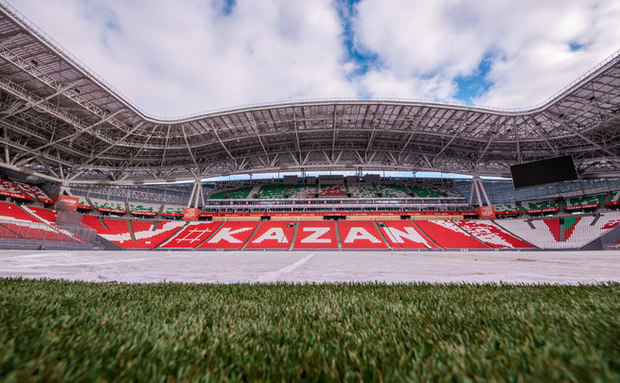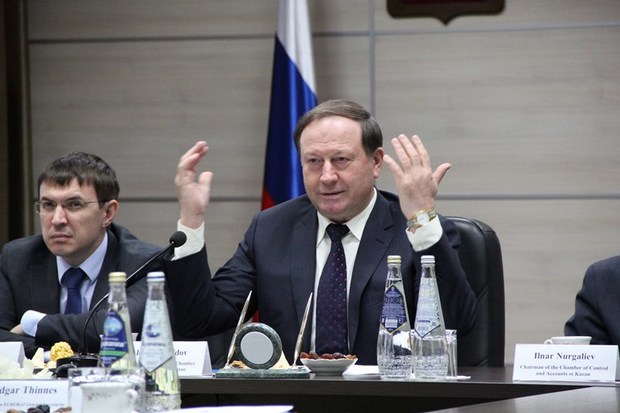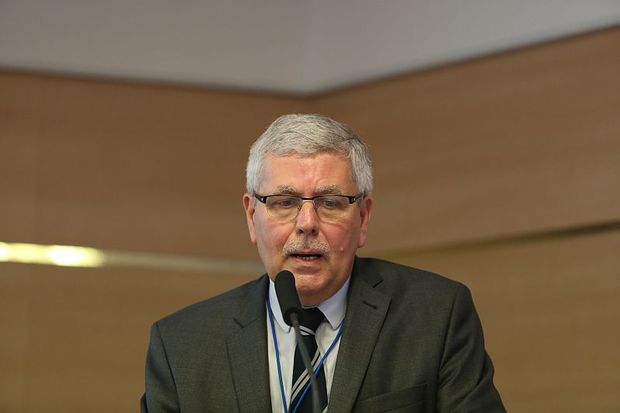Auditor from Geneva: ''We can safely say that over 9 years we still remain in the red due to UEFA Euro 2008!''
Demidov discloses the secret parity between Moscow and Kazan; the auditors tell about cost-effective spending on Games in Glasgow
With the total budget of 2016 FIFA World Cup at 2 billion euros, its host, France, suffered additional costs at 1 million euros, while Geneva after UEFA Euro 2008 is still in the red, failing to cover the budget overruns at 8,5 million Swiss francs. President of the International Association EURORAI François Monti, who gathered in Kazan foreign auditors in anticipation of the matches of 2017 Confederations Cup, acknowledged that it won't be possible to avoid budget overruns during the International Championships. Will Kazan be able to contrive the budget at 3 billion rubles it has received for the qualifying matches of the Confederations Cup?
3 billion rubles for the Cup
How to ''fit in'' the budget estimates in the preparation of international competitions and to turn football stadiums from ''white elephant'' into the working ''gazelle'' with regular games on the field and a large audience of fans? The relevance of these questions never ceases to bother Kazan that after 2013 Universiade annually holds various international championships, torn the laurels of the sports capital of Russia. In the next two years Kazan will remain one of the centres of world football, preparing to host in June the qualifying rounds of the Confederations Cup, and next year — the matches of 2018 FIFA World Cup.
Kazan received 3 billion rubles for the preparations of the World Cup, reported the auditor of the Accounts Chamber Azat Valeyev. Given the fact that funding for these events is carried out by Federal and Republican budgets and the auditing of spending after the fact is led by the Accounts Chamber of Russia, it becomes clear why it is exactly now the Accounts Chamber of Tatarstan has invited foreign auditors of the International Association EURORAI to Kazan. Several days ago, the experts took a walk around the sports venues of Kazan, visiting the football stadium Kazan Arena, Aquatics Palace and even the Badminton Center, which has not become an arena of international competition yet, but is personally patronized by the head of the Accounts Chamber of Tatarstan Aleksey Demidov.

Universiade 2013 lacked 200 billion rubles
The opening of the international seminar of EURORAI, which was attended by external auditors of France, Germany, Geneva, Scotland and representatives of accounts chambers of the 24 regions of the Russian Federation, of course, began with the greetings of President of Tatarstan Rustam Minnikhanov. He wowed the audience with a huge number of sports facilities, the fact, however, has long been known to the citizens. ''35 sports facilities are built in Kazan that are capable to admit simultaneously 14,000 people,'' surprised the president the foreign guests. ''700 of competitions of different level take place there a year. 1,5 million people are involved in doing sports and physical activity annually.'' Turning to the main topic, Rustam Minnikhanov said that the programmes of construction and renovation of sports facilities require control of finances, but now the emphasis is put not on supervision but effectiveness of their use.
After receiving the baton from Rustam Minnikhanov, Minister of Youth Affairs and Sports Vladimir Leonov explained that Kazan originally built titular buildings according to the requirements of international sports federations to be always on the orbit of the international championships. Kazan Arena is the multifunctional stadium that can accommodate even two swimming pools, he cited an example of prudent approach of the state. The minister passed the baton to the external auditor of the Accounts Chamber of Tatarstan Azat Valyeyev. He was directly involved in the audit of budget funds allocated for international competitions in Kazan.
However, he had nothing to tell anything new for the guests, only ''to remove the dust of bygone days''. Having reminded that the total budget of 2013 Universiade amounted to almost 200 billion rubles, he said that on these funds there were built 500 sports facilities, transport, medical infrastructure and security was provided. But this money was not enough. ''In preparation for 2013 Universiade, the Russian government approved a number of decisions on optimization of budget expenditures,'' said the speaker. ''Therefore, design and survey works were carried out for free. Land plots with a total area of 213 hectares under construction again were given for free. Technical connection to networks was carried out on a reduced-tariff.'' In return, the authorities in Tatarstan agreed on the transfer for the federal maintenance 18 out of 35 title sports facilities: they are on the balance sheet of the federal universities.

Stepashin left and the stone was removed!
Spanish external expert from Seville Antonio Gomez asked the Russian colleague how the funding for summer student games in Kazan was organized. ''We have held the Winter Universiade. Did you have to attract private investments?'' he asked. Here the head of the Accounts Chamber of Tatarstan Aleksey Demidov could not resist.
''You know, in the organization of international championships, our president sets the task to attract federal funding,'' he began to explain business relationships with Moscow. ''Because we had this experience. Even before 2013 Universiade, we with the head of the Accounts Chamber of Russia Sergey Stepashin solemnly laid the first stone in the foundation of the Badminton Centre. Stepashin left and the stone was removed somewhere! It was therefore agreed that 60% of funds must be from the federal budget, 40% — from regional. The only way,'' said Demidov.
''What lessons you can give after the Universiade?'' followed the next question from the guests. ''It is better to conduct the audit at the planning stage because then it may happen that nothing can be corrected,'' replied Azat Valeyev. But they did not know the subtle subtext of these words. As Realnoe Vremya was told, it was about the tender for the construction of the stadium Kazan Arena, which was conducted after the fact, and the estimate increased from 9 to 11-13 billion rubles. ''But such was the original arrangement. Then Stepashin himself acknowledged that if the tender procedures were respected, the builders would not meet the deadline.''
Geneva is still in the red after UEFA Euro 2008
However, after the next football championship, the auditors of the International Association of EURORAI record ''new points'' of over expenditure of public funds, not finding a universal recipe for excess spending. According to President of EURORAI François Monti, the world practice has accumulated a wealth of examples, when there was overspending in public investment, but a mechanism to prevent them has not been found. ''Such activities are always planned at the highest political and economic level, so there may be a feeling that there won't be failures,'' said François Monti. Despite the preliminary work, there are always ''bottlenecks'', and our task is to help MPs and local authorities to avoid financial aberrations,'' he said.
President of the Court of Audit of the Canton of Geneva Stanislas Zuin presented the case of budget overruns in the preparation of the championship UEFA Euro 2008, which was funded in partnership by the authorities of Switzerland and Austria. They had to renovate the stadium on 35,000 seats and host three final matches between Portugal, Turkey and the Czech Republic. ''Initially, it was allocated 10 million euros, but UEFA demanded for bringing a football stadium in Geneva to their standards another 3 million Swiss francs. Another 8,5 million francs were needed additionally for logistics — the transportation of fans, and 11 million francs for security,'' he said. The audit revealed that the cars were ordered more than needed, and they operated for nothing, and the police were paid a double rate for nothing. ''In the morning from 8 to 11 a.m. the matches were not held, but the gendarmes still were forced to work,'' the speaker listed the excess costs.

''We can safely say that after 9 years we still remained in the red!'' commented on the facts to the reporters President of the Court of Audit of the Canton of Geneva Stanislas Zuin. ''8.5 million Swiss francs were expended at the request of UEFA mainly for the purchase of large TV screens, VIP lounges and so on. But one of the main reasons why investments do not give the effect is that the local team is not in the top League in Switzerland, so the stadium does not collect a large number of viewers. The stadium is not filled on 100% and to make ends meet,'' said the auditor.
More successfully were arranged Commonwealth Games in Glasgow (Scotland) in 2013. With the budget of 424,5 million pounds, they managed to rescue 530 million pounds, and most of the profit was made on the sale of tickets. The record was set by France. With the total budget of UEFA Euro 2016 at 2 billion euros, its host, France, incurred additional costs at 1 million euros. ''We renovated football stadiums to save at maximum: 3 million euros on ordinary stadiums like in Bordeaux and Toulouse, and up to 7 million euros – for multifunctional ones,'' said Nicolas Billebaud, Magistrate at the Regional Audit Chamber of Auvergne.